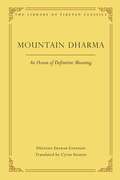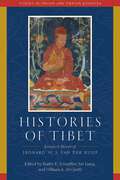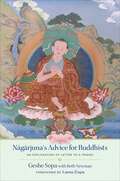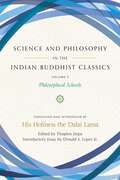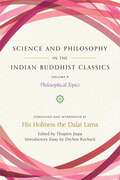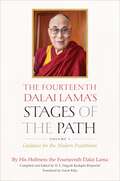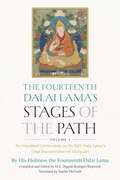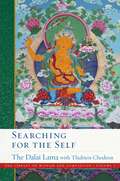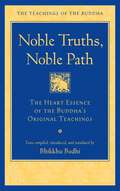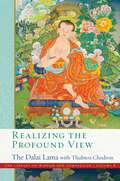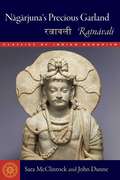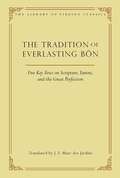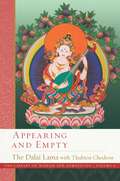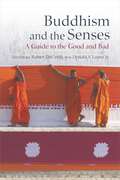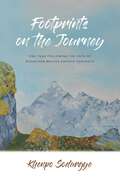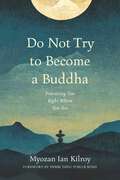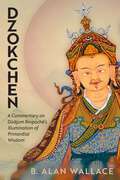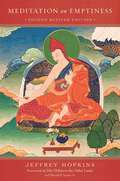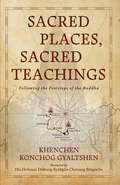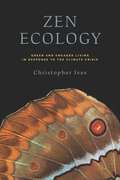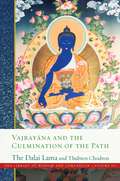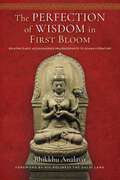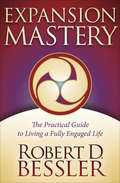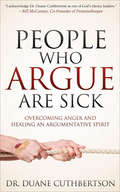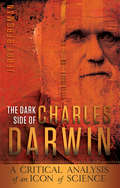- Table View
- List View
Mountain Dharma: An Ocean of Definitive Meaning (Library of Tibetan Classics #7)
by Cyrus Stearns Dolpopa Sherab GyaltsenA brilliant annotated translation of Dölpopa Sherab Gyaltsen&’s Mountain Dharma that opens a masterpiece of the Jonang tradition to Western readers and presents Dölpopa&’s provocative ideas about a true, eternal, and established reality that still impact Buddhism today.The controversial master Dolpopa Sherab Gyaltsen shook Buddhist Tibet when he taught that an eternal enlightened essence, or buddha nature, exists in full form in all living beings. The ideas discussed in Mountain Dharma are still as provocative now as when Dolpopa first taught them, impacting Buddhism to this day. Dolpopa identified the ultimate with the buddha nature, or sugata essence, which he held to be eternal and not empty of self-nature. The buddha nature is perfect, with all its characteristics inherently present in all living beings. It is only the impermanent and temporary afflictions veiling the buddha nature that are empty of self-nature and must be removed through the practice of the path to allow it to manifest. Dolpopa establishes the validity of his theories with an ocean of quotations selected from Indian Buddhist scriptures and treatises of indisputable authority, showing us that the ultimate is a true, eternal, and established reality, empty merely of other relative phenomena.
Histories of Tibet: Essays in Honor of Leonard W. J. van der Kuijp
by Kurtis R. Schaeffer, Jue Liang, and William A. McGrathThe thirty-four essays in this volume follow the particular interests of Leonard van der Kuijp, whose groundbreaking research in Tibetan intellectual and cultural history imbued his students with an abiding sense of curiosity and discovery.As part of Leonard van der Kuijp&’s research in Tibetan history, as he patiently and expertly revealed treasures of the Tibetan intellectual tradition in fourteenth-century Tsang, or seventeenth-century Lhasa, or eighteenth-century Amdo, he developed an international community of colleagues and students. The thirty-four essays in this volume follow the particular interests of the honoree and express the comprehensive research that his international cohort have engaged in alongside his generous tutelage over the course of forty years. He imbued his students with the abiding sense of curiosity and discovery that can be experienced through every one of his writings, and that can be found as well in these new essays in intellectual, cultural, and institutional history by Christopher Beckwith, the late Hubert Decleer, Franz-Karl Ehrhard, Jörg Heimbel and David Jackson, Isabelle Henrion-Dourcy, Nathan Hill, Matthew Kapstein, Kurtis Schaeffer, Michael Witzel, Allison Aitken, Yael Bentor, Pieter Verhagen, Todd Lewis, William McGrath, Peter Schwieger, Gray Tuttle, and others.
Nagarjuna's Advice for Buddhists: Geshe Sopa's Explanation of Letter to a Friend
by Lhundub SopaA modern commentary by a beloved Tibetan teacher on a classical Indian Buddhist text and an introduction to Buddhism by one of the tradition&’s most famous authors. A teaching on how to live a Buddhist life in contemporary society.Letter to A Friend, by the great Indian philosopher Nagarjuna, is one of the best-known introductions to Buddhism in classical Indian Buddhist literature. In this warm and generous commentary, one of the twentieth century&’s most beloved teachers, Geshe Lhundup Sopa, shows how Nagarjuna&’s advice on how to follow Buddhist ethics while living fully in the world speaks just as clearly to us today as it did to the Indian king for whom it was composed. Nagarjuna maintained that all Buddhists can embody the full teachings of the Buddha. Therefore, this book covers topics from simple virtues to the most profound truths of emptiness. Expertly compiled by his student, scholar Beth Newman, from talks given over a number of years, the commentary brings this ancient Buddhist teaching to a modern audience.
Science and Philosophy in the Indian Buddhist Classics, Vol. 3: Philosophical Schools
by His Holiness Dalai LamaDeepen your understanding of meaning and truth with the third volume of the Dalai Lama&’s esteemed series Science and Philosophy in the Indian Buddhist Classics.Science and Philosophy in the Indian Buddhist Classics compiles classical Buddhist explorations of the nature of the material world, the human mind, reason, and liberation, and puts them into context for the modern reader. This ambitious four-volume series—a major resource for the history of ideas and especially the history of science and philosophy—has been conceived by and compiled under the visionary supervision of His Holiness the Dalai Lama himself. It is his view that the exploratory thinking of the great masters of classical India still has much that is of interest to us today, whether we are Buddhist or not. These volumes make those insights accessible. In this third volume the focus turns to exploring the philosophical schools of India. The practice of presenting the views of various schools of philosophy dates back to the first millennium in India, when proponents of competing traditions would arrange the diverse sets of philosophical positions in a hierarchy culminating in their own school&’s superior tenets. Centuries later, relying on the Indian Buddhist treatises, Tibet developed its own tradition of works on tenets (grub mtha&’), often centered on the four schools of Buddhist philosophy, using them to demonstrate the philosophical evolution within their own tradition, and within individual practitioners, as they progressed through increasingly more subtle expressions of the true reality. The present work follows in this venerable tradition, but with a modern twist. Like its predecessors, it presents the views of seven non-Buddhist schools, those of the Samkhya, Vaisesika, Nyaya, Mimamsa, Vedanta, Jaina, and Lokayata, followed by the Buddhist Vaibhasika, Sautrantika, Cittamatra, and Madhyamaka schools, arranging them like steps on a ladder to the profound. But rather than following in the sharply polemical approach of its ancient predecessors, it strives to survey each tradition authentically, relying on and citing the texts sacred to each, allowing the different traditions to speak for themselves. What, it asks, are the basic components of the world we experience? What is the nature of their ultimate reality? And how can we come to experience that for ourselves? See how the rich spiritual traditions of India approached these key questions, where they agreed, and how they evolved through dialogue and debate. This presentation of philosophical schools is introduced by His Holiness and is accompanied by an extensive introduction and survey by Professor Donald Lopez Jr. of the University of Michigan, who is uniquely qualified to communicate the scope and significance of this literary and spiritual heritage to modern readers.
Science and Philosophy in the Indian Buddhist Classics, Vol. 4: Philosophical Topics
by His Holiness the Dalai LamaThis fourth and final Science and Philosophy in the Indian Buddhist Classics volume provides, through extensive passages, a window into the works of the great thinkers from the flowering of philosophy in classical India.This is the second philosophy volume in the Science and Philosophy series. Whereas the first philosophy volume presented the views of the non-Buddhist and Buddhist schools in sequence, the present work selects specific topics for consideration, including the nature of the two truths, the analysis of self, the Yogacara explanation of reality, emptiness in the Madhyamaka tradition, a survey of logic and epistemology, and the Buddhist explanation of language and meaning. Like earlier volumes, it provides, through extensive extracts, a window into the works of the masters of the Nalanda tradition. The final section on language is particularly unique and largely crafted by Thupten Jinpa.
The Fourteenth Dalai Lama's Stages of the Path, Volume One: Guidance for the Modern Practitioner
by His Holiness the Dalai LamaDiscover His Holiness the Dalai Lama&’s advice for finding happiness, helping others, and applying insights from Buddhist thought to everyday life—for a life of greater harmony, meaning, and joy, for ourselves, others, and in our world.This first volume of The Fourteenth Dalai Lama&’s Stages of the Path shares His Holiness&’s teachings on specific topics of vital relevance to contemporary life: - how kindness and compassion are the foundation for individual happiness and world peace; - how we can solve manmade problems; - how Buddhism does not conflict with modern science and can actually contribute to its advancement; - how gender equality is fundamental for a decent and just society; - and much more. His Holiness&’s messages on these topics will be of value to all readers, Buddhists and non-Buddhists alike. These teachings embody the Dalai Lama's generous warmth and humor, his expertise in presenting important Buddhist ideas, and his ability to inspire us toward greater kindness and happiness.
The Fourteenth Dalai Lama's Stages of the Path, Volume 2: An Annotated Commentary on the Fifth Dalai Lama's Oral Transmission of Mañjusri
by His Holiness the Dalai LamaCentral to Buddhism is knowing our own minds. Until we do, we are driven by unconscious, often destructive desire and aversion.The Fourteenth Dalai Lama&’s Stages of the Path: An Annotated Commentary on the Fifth Dalai Lama's Oral Transmission of Mañjusri is the second volume of the Dalai Lama&’s outline of Buddhist theory and practice. Having introduced Buddhist ideas in the context of modern society in volume one, the Dalai Lama turns here to a traditional presentation of the complete path to enlightenment, from developing faith in the Dharma to attaining the highest wisdom. This book, compiled by the revered Tibetan lama Dagyab Rinpoché, comments on the Fifth Dalai Lama&’s stages of the path titled Oral Transmission of Mañjusri. The volume will appeal to all readers interested in the Dalai Lama&’s works, both those new to Buddhism and those looking to deepen their understanding of the Tibetan presentation of the Buddhist path.
Searching for the Self (The Library of Wisdom and Compassion #7)
by His Holiness the Dalai Lama Venerable Thubten ChodronHis Holiness the Dalai Lama explores emptiness, one of the most central teachings in Buddhism, in the newest volume of the bestselling series The Library of Wisdom and Compassion.In Searching for the Self the Dalai Lama leads us to delve deeply into the topic of the ultimate nature of reality, presenting it from a variety of approaches while focusing on identifying our erroneous views and directing us to the actual mode of existence of all persons and phenomena. Placing our study of reality within the auspicious context of a compassionate motivation to benefit all sentient beings, the Dalai Lama explains why realizing emptiness is important and what qualities are needed to do that, and he evaluates various tenet systems&’ perspectives on this vast topic. He then helps us understand our perceptions and the mental states involved in both our ignorant and accurate cognitions. He examines inherent existence and other fantasized ways of existence that we seek to disprove through reasoned analysis and presents the Middle Way view that abandons all extremes. The closing chapters by Thubten Chodron discuss the three characteristics of impermanence, unsatisfactoriness, and not-self as explained in the Pali tradition and show how meditation on these can lead to the meditative breakthrough to realize nirvana. Engaging in this investigation with His Holiness will challenge our deepest-held beliefs and uproot false ways of viewing ourselves and the world that are so habitual we don&’t even notice them. Get ready to be challenged and intrigued, for realizing the nature of reality has the power to cut our defilements at the root and free us from cyclic existence forever!
Noble Truths, Noble Path: The Heart Essence of the Buddha's Original Teachings
by Bhikkhu BodhiBrilliantly translated by Bhikkhu Bodhi, this anthology of suttas from the Samyutta Nikaya takes us straight to the heart of the Buddha&’s teaching on liberation through the four noble truths and the noble eightfold path—the two mainstays of Buddhist doctrine that illuminate the nature of things by generating direct insight into the teachings. These suttas all pertain to the ultimate good, the attainment of nibbana, or liberation. They illuminate the Buddha&’s radical diagnosis of the human condition—and more broadly, the condition of all sentient existence—in light of the four noble truths. They underscore the pervasive flaws inherent in the round of rebirths, trace our existential predicament to its deepest roots, and lay out the path to unraveling our bondage and winning irreversible release. Ven. Bodhi arranged the chapters, each with its own introduction, to provide an overview of the Dhamma that mirrors the four noble truths, thus enabling students of Early Buddhism to see into the heart of the Buddha&’s teachings as directly and clearly as possible.
Realizing the Profound View (The Library of Wisdom and Compassion #8)
by His Holiness the Dalai Lama Venerable Thubten CnodronThe eighth volume in the Dalai Lama&’s definitive and bestselling Library of Wisdom and Compassion series, and the second of three focusing on emptiness.In Realizing the Profound View the Dalai Lama presents the analysis and meditations necessary to realize the ultimate nature of reality. With attention to Nagarjuna&’s five-point analysis, Candrakirti&’s seven-point examination, and Pali sutras, the Dalai Lama leads us to investigate who or what is the person. Are we our body? Our mind? If we are not inherently either of them, how do we exist, and what carries the karma from one life to the next? As we explore these and other fascinating questions, he skillfully guides us along the path, avoiding the chasms of absolutism and nihilism, and introduces us to dependent arising. We find that although all persons and phenomena lack an inherent essence, they do exist dependently. This nominally imputed mere I carries the karmic seeds. We discover that all phenomena exist by being merely designated by term and concept—they appear as like illusions, unfindable under ultimate analysis but functioning on the conventional level. Furthermore, we come to understand that emptiness dawns as the meaning of dependent arising, and dependent arising dawns as the meaning of emptiness. The ability to posit subtle dependent arisings in the face of realizing emptiness and to establish ultimate and conventional truths as non-contradictory brings us to the culmination of the correct view. The second of three volumes on the nature of reality in the Library of Wisdom and Compassion series, Realizing the Profound View challenges the ways we view the self and the world, bringing us that much closer to liberation.
Nagarjuna's Precious Garland: Ratnavali (Classics of Indian Buddhism)
by Sara McClintockDiscover the eloquence and insight of the philosopher Nagarjuna, held by tradition to be a second Buddha, in this concise instruction for a king that is considered a masterpiece of Buddhist literature.In this profound work of five hundred verses, we encounter a presentation of Buddhism that integrates both the worldly and the transcendent. The clear and sagacious advice laid out on every page serves as a road map to one&’s highest goal—whether that goal is a better life, here called the Dharma of ascendance, or the ultimate one of spiritual freedom, the Dharma of the highest good. The verses, written for an unnamed ruler, touch on questions of statecraft, but their broader themes speak to us today because they tackle the difficulty of integrating one&’s spiritual journey with the social and political demands of daily life. Nagarjuna was an Indian Buddhist teacher, probably of the second century CE, who was renowned for his astute articulation of the philosophy of the Middle Way (Madhyamaka). His thoroughgoing critique of all forms of essentialism became a touchstone for Mahayana Buddhism in India, Tibet, and throughout East Asia, and his importance for the development of the Mahayana tradition can scarcely be exaggerated. The translators here first rendered Nagarjuna&’s letter for the Dalai Lama&’s teachings on the work in Los Angeles in 1997. While that commemorative edition was translated from the Tibetan, the present volume prioritizes the surviving Sanskrit verses along with the only known Indian commentary, by the eleventh-century scholar Ajitamitra. This is the first complete translation in English of the Precious Garland that takes the Indian text and commentary as its primary authorities. In addition, the translators provide rigorous working editions of the Sanskrit and Tibetan verses they translate. This elegant and precise rendering of Nagarjuna&’s work is certain to become the touchstone translation of this celebrated Buddhist text.
The Tradition of Everlasting Bön: Five Key Texts on Scripture, Tantra, and the Great Perfection
by J. F. Marc des JardinsAn annotated translation of five key texts of the Everlasting (Yungdrung) Bön school selected by the late H. H. Menri Trizin Rinpoché that includes scriptural teachings, a root tantra based on revealed teachings of the unconditioned absolute, a canonical commentary on the root tantra, an exposition of the Yungdrung tantric system, and the oral instructions on Bön meditation practices associated with experiencing the nature of the mind, the Great Perfection systems.This authoritative annotated translation of five key texts of Everlasting (Yungdrung) Bön by Marc des Jardins opens up a relatively unknown tradition that, since the arrival of Buddhism in Tibet, has undergone great transformations in its philosophy, doctrinal teachings, and meditative practices. Each text represents an important aspect of the tradition. The first text, by Drogön Azha Lodrö Gyaltsen (1198–1263), presents the grounds and paths of the Greater Vehicle of the Bön tradition and represents the philosophical ideology of its teachings based on the scriptures contained in the Bön canon. The second text is a short root tantra attributed to revealed teachings from Kuntu Zangpo, the personification of the unconditioned absolute. The third text is a commentary on this root tantra attributed to Drenpa Namkha (fl. eighth century), a Bönpo sage contemporary with Padmasambhava. The fourth text, by Nyamé Sherap Gyaltsen (1356–1415), presents a general exposition of the tantric system according to Yungdrung Bön. The final text, by Drutön Gyalwa Yungdrung (1242–90), pertains to the oral instructions on the meditation practices of Bön, especially on the cycle of practices associated with experiencing the nature of the mind, the Great Perfection systems. All five texts have been selected by the late H. H. Menri Trizin Rinpoché, Lungtok Tenpai Nyima (1927–2017), the thirty-third abbot of Menri Monastery, the central institution of the Yungdrung Bön school.
Appearing and Empty (The Library of Wisdom and Compassion #9)
by Venerable Thubten Chodron His Holiness the Dalai LamaIn this final volume on emptiness, the Dalai Lama skillfully reveals the Prasangikas&’ view of the ultimate nature of reality so that we will gain the correct view of emptiness, the selflessness of both persons and phenomena, and have the means to eliminate our own and others&’ duhkha.In this last of three volumes on emptiness, the Dalai Lama takes us through the Sautrantika, Yogacara, and Svatantrika views on the ultimate nature of reality and the Prasangikas&’ thorough responses to these, so that we gain the correct view of emptiness—the selflessness of both persons and phenomena. This view entails negating inherent existence while also being able to establish conventional existence: emptiness does not mean nothingness. We then learn how to meditate on the correct view by cultivating pristine wisdom that is the union of serenity and insight as taught in the Pali, Chinese, and Tibetan traditions. Such meditation, when combined with the altruistic intention of bodhicitta, leads to the complete eradication of all defilements that obscure our minds. This volume also introduces us to the tathagatagarbha—the buddha essence—and how it is understood in both Tibet and China. Is it permanent? Does everyone have it? In addition, the discussion of sudden and gradual awakening in Zen (Chan) Buddhism and in Tibetan Buddhism is fascinating.
Buddhism and the Senses: A Guide to the Good and Bad
by Donald S. Lopez Jr. Robert DeCroliAcross Buddhist traditions, the five senses—sight, sound, smell, taste, and touch—are perceived both positively and negatively. Share our eminent scholars&’ fascination and deep insight into what makes a sensuous experience good or bad.Following on the exhibition Encountering the Buddha: Art and Practice across Asia at the National Museum of Asian Art, ten eminent scholars present their insights into Buddhism&’s fascinating relation with the five senses (sight, sound, smell, taste, and touch), which careens between delight and disgust, rarely finding a middle way. While much of Buddhist literature is devoted to overcoming the attachment that dooms us to rebirth in samsara, primarily by deprecating sense experience and showing that whatever brings us sensual pleasure leads only to physical and mental pain, in texts such as the Lotus Sutra, sensory powers do not offer sensory pleasure but rather knowledge, clear observation, and ability to teach the Dharma. Considering such religiously and historically contingent ambiguity, this volume presents each of the five senses in two instantiations, the good and the bad, opening up the discourse on the senses across Buddhist traditions. Just as the museum departed from tradition to incorporate sensory experiences into the exhibition, this volume is a new direction in scholarship to humanize Buddhist studies by foregrounding sensory experience and practice, inviting the reader to think about the senses in a focused manner and shifting our understanding of Buddhism from the conceptual to the material or practical, from the idealized to the human, from the abstract to the grounded, from the mind to the body.
Footprints on the Journey: One Year Following the Path of Dzogchen Master Khenpo Sodargye
by Khenpo SodargyeInspiring diary entries from a challenging year in the life of the renowned Dzogchen master Khenpo Sodargye demonstrate right conduct for the path to liberation.This personal diary that the renowned Dzogchen master Khenpo Sodargye kept for one year gives serious Dharma practitioners a lifetime of inspiring, wise guidance for practicing right conduct on the path. The backdrop is the Tibetan plateau, from which Khenpo invites us to see the world—from native people to a spider, from vast galaxies to a water droplet—as he does, with candor and humor, and with a Dzogchen master&’s sharp analysis. He shares with us his perceptions of this world, describing his ups and downs in a way that we can relate to and be inspired by, even if we do not have the fortitude to stand up to the oppression of crustaceans or to ransom yaks from the slaughterhouse. Spontaneous and lively, the entries play out the vicissitudes of his life throughout a challenging year, tracking the passage of his thoughts and actions, leaving footprints for whoever is able to follow.
Do Not Try to Become a Buddha
by Ian KilroyA Zen Buddhist priest paints a picture of Zen in Ireland in this collection of short essays.In this personal and enlightening collection of short essays, Irish Soto Zen priest Myozan Ian Kilroy describes how he came to practice Zen, introduces the basics of Zen philosophy, and recalls the challenges of establishing a Zen Buddhist community in Catholic-dominated Ireland. Along the way, he explores the rituals and practices that Zen brings to everyday life, from holidays to weddings to birth ceremonies to funerals. A former journalist, Rev. Myozan&’s clear yet entertaining storytelling style paints a clear picture of how Zen has adapted to the culture and traditions of Ireland.
Dzokchen: A Commentary on Dudjom Rinpoché's "Illumination of Primordial Wisdom"
by B. Alan WallacePith Instructions for Realizing the Great Perfection, from One of the Greatest Tibetan Yogis of the Twentieth Century.In the concise yet comprehensive practice manual entitled The Illumination of Primordial Consciousness, the great twentieth-century Tibetan Nyingma master Dudjom Rinpoche lays out a sequential path to spiritual freedom according to the teachings of the Great Perfection (Dzokchen): First, we refine our awareness by training in meditative quiescence (shamatha) and then proceed to the cultivation of contemplative insight (vipashyana), by which our mind&’s basic nature of luminosity and emptiness is revealed. Then, having recognized that the ordinary, deluded mind is actually without any intrinsic essence, we are primed to cut through this conditioned mind into unborn, timeless pristine awareness, which has never been contaminated by mental afflictions or other obscurations. Finally, we realize that our own awareness has never been other than the dharmakaya, the mind of a buddha, and perfect enlightenment is realized spontaneously and effortlessly. In this book, beloved teacher and renowned scholar Lama B. Alan Wallace shares insights gained over years of study, providing a line-by-line explanation interspersed with background teachings from revered Dzokchen scriptures written by Padmasambhava, Dudjom Lingpa, and others. Also included are a set of fifteen guided meditations given by Lama Alan, along with links to audio tracks of Lama Alan giving the instructions himself. Through the practices he describes, the mystery of the mind—its origin and what happens to it at death–is thus illuminated through one&’s own meditative experience.
Meditation on Emptiness
by Jeffrey HopkinsA comprehensive and in-depth survey of the philosophical underpinnings of the Dalai Lama&’s Geluk tradition written by one of the founding figures of Tibetan Buddhist studies in the West.In this classic work of Buddhist studies scholarship, Jeffrey Hopkins—one of the world&’s foremost scholar-practitioners of Tibetan Buddhism—offers a clear exposition of the Prasangika-Madhyamaka view of emptiness as presented in the Geluk tradition of Tibetan Buddhism. In bringing this remarkable and complex philosophy to life, he describes the meditational practices by which emptiness can be realized and shows throughout that, far from being merely abstract scholasticism, these classic teachings can be vivid and utterly practical. Treating subjects ranging from the progressive path of meditation to the nature of emptiness and how it can be directly realized, this wide-ranging book guides the reader on an itinerary of intellectual and spiritual discovery, unpacking the distinctive Geluk synthesis of scholastic and meditative practices. The first study in any Western language to provide a comprehensive treatment of the doctrines and practices of a Tibetan Buddhist school, this book is indispensable for those wishing to delve deeply into Buddhist thought and its practical relevance.
Sacred Places, Sacred Teachings: Following the Footsteps of the Buddha
by Khenchen Konchog GyaltshenA guide to following the footsteps of the Buddha—for the pilgrim in India and at home.The holy sites of India—Bodh Gaya, Sarnath, Shravasti, and others— became holy because the Buddha blessed them by performing his enlightened activities there. When we become holy through our practice of the Buddha&’s instructions, then the places we go will be made holy, too. Through meditation practice, we can realize and capture what the Buddha described as the profundity of the mind, which is completely peaceful, free from elaboration, luminous, and uncompounded. In this wise, heartfelt, and indispensable guide, Khenchen Konchog Gyaltshen takes us on a journey through the major holy sites for Buddhist pilgrimage by offering profound teachings related to each of the sacred places. In Bodh Gaya, the site of the Bodhi tree and the Buddha&’s enlightenment, we learn of how the Buddha became enlightened and what it means to take refuge in him; we uncover the profundity of emptiness at the site where the Buddha expounded the Heart Sutra; at the place of the Buddha&’s passing, we learn that the legacy of his vast teachings came about through his perfection of bodhicitta—a core quality we can master, too. In chapters based on these and other sacred places, we find that the wisdom the Buddha uncovered is available to us all. The Buddha discovered total satisfaction, the ultimate achievement, and left instructions on how we, too, can achieve the same. We already have this great path; we just have to follow it. In that way, we experience the joy of following the footsteps of the Buddha.
Zen Ecology: Green and Engaged Living in Response to the Climate Crisis
by Christopher IvesDiscover a way of living that can help you slow down and stay grounded—and at the same time reduce your ecological impact and engage more fully with the climate crisis.It may seem as though living ecologically and engaging in activism sacrifices our own enjoyment and happiness on the altar of doing the right thing. In this book, professor, naturalist, and Buddhist author Christopher Ives offers an alternative: a way of living that can actually be more fulfilling than the modern consumerist lifestyle. Rather than deprivation, it can bring us richness. In Zen Ecology, Chris outlines his environmental ethic as a series of concentric circles, beginning with ourselves and then moving outward into our communities, all the while focusing on spaciousness, mindfulness, generosity, and contentment. At the individual level, we deal with distraction, clutter, and ecological harm. Here, Chris offers ways to help us pay attention, simplify our lives, and lower our impact. Then, we explore how to envision our home as a &“place of the Way,&” with Zen monastic life as a model for this—without having to be a monk! Next, we realize our embeddedness in nature and emplace ourselves in community with others, including other forms of life. Finally, we build on this basis to engage in activism to create a world that is more supportive of ecological health and spiritual fulfillment. In this way, we avoid the two extremes of apathy and burnout, and uncover a way of living that is simple, joyful, embedded in nature, connected to others in community, and supportive of collective action.
Vajrayana and the Culmination of the Path (The Library of Wisdom and Compassion #10)
by Dalai Lama Venerable Thubten ChodronThe final volume of the Library of Wisdom and Compassion by His Holiness the Dalai Lama takes us to the uncommon practices and realizations of Vajrayana to the full awakening of a buddha.His Holiness the Dalai Lama skillfully illuminates the unique qualities of Vajrayana, as practiced in Tibet, and the method to eradicate the subtlest obscurations preventing the full awakening of a buddha. Speaking to newcomers and advanced students alike, he explains the similarities and differences of the Sutra and Tantra paths. Having gathered many of the doubts and difficult points concerning the tantric path, he clarifies the purpose of receiving proper empowerment by qualified gurus and the ethical restraints and commitments required to enter the path of secret mantra. The paths and stages of the four tantric classes are explained, as are the generation-stage and completion-stage practices of Highest Yoga Tantra. You are introduced to the practices of clear appearance and divine identity common to all tantric sadhanas, as well as the distinctive practices of illusory body and actual clear light that overcome the subtlest defilements on the mind and eliminate all obscurations quickly. The understanding of emptiness in Sutra and Tantra is the same, but the consciousness perceiving emptiness differs. In Highest Yoga Tantra that consciousness is great bliss, which arises from knowing the methods to manipulate the channels, winds, and drops of the subtle body. In short, in Vajrayana and the Culmination of the Path the Dalai Lama sets out the path that leads to blissful awakening and enables us to be of great benefit to all sentient beings.
The Perfection of Wisdom in First Bloom: Relating Early Astasahasrika Prajnaparamita to Agama Literature
by Bhikkhu AnalayoSee the formative years of Mahayana Buddhist literature through the lens of the Perfection of Wisdom, expertly analyzed by the venerable scholar-monk Bhikkhu Analayo.In this work we have a rare perspective on the early history of Mahayana Buddhism and the Perfection of Wisdom (Prajnaparamita), as far as this is still accessible in surviving texts. With his characteristic clarity and precision, Bhikkhu Analayo critically analyzes early Perfection of Wisdom literature based on the earliest extant versions of the Astasahasrika Prajnaparamita, or the Perfection of Wisdom in Eight Thousand Lines, one in Chinese and the other in Gandhari—one of the oldest surviving Mahayana manuscripts discovered to date. In reading this text from the viewpoint of early Buddhist literature, the author shows that what has generally been considered a sharp rupture in the formation of the Mahayana turns out to be more of a gradual evolution. With his command of the languages of the ancient Buddhist world, scholar-monk Bhikkhu Analayo sifts through the layers of history and unveils new perspectives on the ideas and figures in early Perfection of Wisdom and Mahayana literature, covering such topics as the rhetoric of emptiness and the emerging bodhisattva ideal, as well as the status of women and the practice of self-immolation. In doing so, Bhikkhu Analayo reveals fresh insights into the gradual development that informs the emergence of early Perfection of Wisdom literature. This is a rare opportunity to peer through a window at the beginnings of Mahayana thought—before the traditions had coalesced into the familiar forms we see today.
Expansion Mastery: The Practical Guide to Living a Fully Engaged Life
by Robert D. Bessler&“Puts ancient Taoist principles to work in practical modern life . . . Readers will be inspired, uplifted, and educated on how to make the impossible possible&” (Michael Winn, founder HealingTaoUSA.com). We are currently living in one of the greatest times of human growth, potential and change. Expansion Mastery is designed to offer a way for people to reawaken to the vastness of their ability and to live happy, mindful and balanced lives in this time of great human evolution. The Expansion Mastery System extracts the essence of ancient, esoteric teachings to eliminate the mystery, and from this knowledge presents practical exercises and tools for positive transformation. These teachings are detailed specifically from their ancient sources, yet presented so that they can be applied to anyone&’s personal belief system and life situation.
People Who Argue Are Sick: Overcoming Anger and Healing an Argumentative Spirit
by Duane CuthbertsonWe live in a world of anger and violence. National and international tensions surround us. It it possible to discern the source of such wrath? Dr. Cuthbertson will share with you that the “human spirit” can be “crushed” and “fractured.” Both temperament and environmental factors are involved. If you have ever had an argument, "People Who Ague Are Sick" is definitely for you. The author will give to you not only hope, but also a technique for healing. Let’s be bold. . ."People Who Ague Are Sick" has the potential to not only change you and your home, but to change the whole world. Through "People Who Ague Are Sick" you will learn that your argumentative spirit can be healed, you potentially have had your last argument, domestic violence can subside, there can be less violence in the world.
The Dark Side of Charles Darwin: A Critical Analysis of an Icon of Science
by Dr Jerry BergmanA single man stands behind the greatest deception in history. Charles Darwin's ideas still penetrate every aspect of our culture, including science, religion, and education. And while much has been made of his contribution to the evolutionary hypothesis, little has been publicized about the dark side of the man himself and how this may have impacted the quality and legitimacy of his research. This daring and compelling book takes its readers behind the popular facade of a man revered worldwide as a scientific pioneer, and unveils what kind of person Darwin really was. The book reveals disturbing facts that will help you: Perceive Darwin firsthand through the eyes of family and friends, and his own correspondence Discern this darkly troubled man, struggling with physical and mental health issues Uncover his views on eugenics and racism, and his belief that women were less evolved than men Thoroughly documented, this book reveals Darwin's less-than-above board methods of attempting to prove his so-called scientific beliefs, and his plot to "murder God" by challenging the then-dominant biblical worldview.
